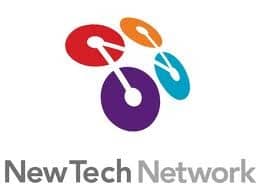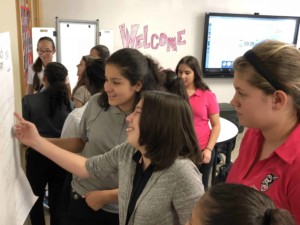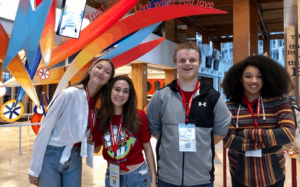Success at New Tech Academy

By: Tim Presiado
This post is part 2 of a three-part series on New Tech Network’s (NTN) annual data report and how NTN helps all students achieve success in college and career.
In Part 1 of this series on teaching students the skills needed to succeed today in college and career, I talked with Tim Heck, Principal of Bonsall New Tech High in Bonsall, Calif — a suburban school about 45 miles north of the San Diego airport. Bonsall is a predominantly middle class suburb with the number of students participating in the National School Lunch Program (FRL) at only about 12%.
In Part 2, I’ll focus on New Tech Academy @ Ft. Wayne – an urban school in Ft. Wayne, Indiana, with more than 70% of students participating in the National School Lunch Program (FRL).
Elizabeth Bryan, Principal of New Tech Academy @ Ft. Wayne, shares a passion for great education with the leaders of the Ft. Wayne business community. “It was the local business community that became very aggressive when looking for ways to better educate our students,” said Elizabeth. “This group of business leaders, along with local educators, obtained a Lilly grant from the State of Indiana to investigate different teaching methods in high schools around the country resulting in the funding and opening of New Tech Academy @ Ft. Wayne in 2009.”
What was the business community’s motivation in working to effect change in the students’ education? “Northeast Indiana (where Ft. Wayne is located) is historically very industrial, as demonstrated by the large General Motors plant in town,” explained Elizabeth. “Biomed companies such as Biomet and Zimmer were starting to relocate to Ft. Wayne and couldn’t find a skilled workforce for open positions. It became apparent that we were no longer graduating students to only work on factory assembly lines. Our students needed higher level STEM skills (science, technology, engineering, math) to qualify for the new local jobs.”
New Tech Academy @ Ft. Wayne partnered with Ft. Wayne Metals to develop school-wide learning outcomes to help graduate students prepare for jobs in the local workforce. As Elizabeth explained, this local business couldn’t find employees with the work ethic to come to work five days a week. “In addition, the students weren’t critical thinkers which made it difficult for them to find solutions to problems on their own.” So New Tech Academy gave them the skills of Deeper Learning such as critical thinking, collaboration, creativity and community.
Another Ft. Wayne company, AccuGear — a subsidiary of AAM offered a different proposal to the school —If the school could produce students with a work ethic as well as skills like collaboration and communication, AccuGear would provide engineering internships to graduating seniors.
Currently, three New Tech Academy graduates are interning at AccuGear. Elizabeth said, “Students start their internships the day after high school graduation. AccuGear works with New Tech Academy’s students to accommodate their college class schedules so they fit in with their work hours. AccuGear also provides guidance as to what is needed for specific courses. If a student is taking a mechanical engineering course, AccuGear has them work with a mechanical engineer. At first, the students work in the factory, but then proceed to work with engineers at electrical and mechanical engineering stations.”
New Tech Academy also offers some college-level courses and has a partnership with IT Tech who paid for the school to have Project “Lead the Way” incorporate STEM courses into the curriculum.
After four full years as a New Tech school, it’s apparent there has been a culture shift at New Tech Academy. “We are now much more open to critical feedback from peers as well as students,” said Elizabeth. “And we’ve seen a strong sense of resilience emerge among our students. They are so used to experiencing hurdles in their school and personal lives, but they are now very resilient at finding ways to navigate these challenges.”
What other changes have occurred since New Tech Academy first opened? “We have gotten better at helping our students assimilate into a Project-Based Learning (PBL) environment,” added Elizabeth. “Freshmen started school still craving a worksheet because it was easier than doing a collaborative project. But now they don’t.”
How has the relationship between the school and parents changed during the past four years? “When we first opened in 2009, we barely had 91 students,” said Elizabeth. “It was difficult for those students to stay on course and parents were confused about the technology aspects of our teaching methods. Now we have a huge waiting list and use a lottery system for accepting students.”
Elizabeth said there has been continuous improvement in the school and its culture. “Now that we’re in our fifth year, we have a better knowledge of who we are and what we do. We’ve gotten better at communicating with parents and the community. We’ve started getting applications from siblings of former and current students — which is a true testament that we’re doing something right.”
Parents understand the opportunity at New Tech Academy. “Before New Tech, some of the ‘at risk’ students were very adept at ‘hiding’ in their school environments,” explained Elizabeth. “They would be the typical student that would ‘slip through the cracks.’ Parents now understand that (at New Tech) their students cannot be invisible and ‘disappear.’ Our students are accountable for their actions. They are taught to be self-reliant and dependable. There are expectations for their behavior. It’s all part of the culture,” said Elizabeth.
The third blog in this three-part series will focus on Cross County High School, a rural school in Cherry Valley, Arkansas, about 120 miles from Little Rock with more than 75% of students participating in the National School Lunch Program (FRL)
Tim Presiado currently serves as the Interim President of New Tech Network, Tim’s primary focus is to help cultivate and support new schools in the planning and implementation of the New Tech model. As President of New Tech Network, he directs strategy, new initiatives, product development, and school development services. Among the chief initiatives for New Tech are expanding its network of over 130 schools, digital learning for students and teachers, further development of the learning management system, NTN Echo and expansion into K-12.




shwan michael
Hi, Tim
Thanks for giving such good points , I am very by great reading . Thanks for share